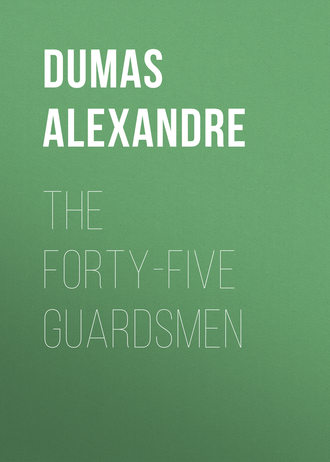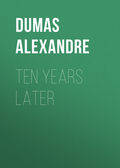
Александр Дюма
The Forty-Five Guardsmen
CHAPTER LXVII.
EXPLANATION
The danger that Remy braved was a real one, for the traveler, after having passed the village and gone on for a quarter of a league, and seeing no one before him, made up his mind that those whom he sought had remained behind in the village. He would not retrace his steps, but lay down in a field of clover; having made his horse descend into one of those deep ditches which in Flanders serve as divisions between the properties, he was therefore able to see without being seen. This young man, as Remy knew, and Diana suspected, was Henri du Bouchage, whom a strange fatality threw once more into the presence of the woman he had determined to fly. After his conversation with Remy, on the threshold of the mysterious house, that is to say, after the loss of all his hopes, he had returned to the Hotel Joyeuse, quite decided to put an end to a life which he felt to be so miserable, and as a gentleman, and one who had his name to keep untarnished, he decided on the glorious suicide of the field of battle.
Therefore, as they were fighting in Flanders, and his brother had a command there, Henri, on the following day, left his hotel twenty hours after the departure of Diana and Remy.
Letters from Flanders announced the intended coup de main on Antwerp, and Henri hoped to arrive in time for it. He pleased himself with the idea that he should die sword in hand, in his brother's arms, under a French flag, and that his death would be talked about until the sound even reached the solitude in which the mysterious lady lived. Noble follies! glorious, yet sad dreams!
Just as – full of these thoughts – he came in sight of Valenciennes, from whose church tower eight o'clock was sounding, he perceived that they were about to close the gates. He pushed on, and nearly overturned, on the drawbridge, a man who was fastening the girths of his horse. Henri stopped to make excuses to the man, who turned at the sound of his voice, and then quickly turned away again. Henri started, but immediately thought, "I must be mad; Remy here, whom I left four days ago in the Rue de Bussy; here now, without his mistress. Really, grief must be turning my brain and making me see everything in the form of my own fancies." And he continued his way, convinced that his idea had been pure fancy. At the first hotel that he came to he stopped, gave his horse to a servant, and sat down on a bench before the door, while they prepared his bed and supper. But as he sat there he saw two travelers approaching, and this time he saw more clearly.
"Now," murmured he, "I do not dream, and still I think I see Remy. I cannot remain in this uncertainty; I must clear up my doubts."
He got up and ran down the road after them, but they had disappeared. Then he went to all the hotels and questioned the servants, and after much search discovered that two cavaliers had been seen going toward a small inn in the Rue de Beffroi. The landlord was just shutting the doors when Henri entered. While the man offered him rooms and refreshment, he looked round, and saw on the top of the staircase Remy going up, lighted by a servant; of his companion he saw nothing. Du Bouchage had no longer any doubts, and he asked himself, with a dreadful sinking of the heart, why Remy had left his mistress and was traveling without her; for Henri had been so occupied in identifying Remy, that he had scarcely looked at his companion. The next morning when he rose, he was much surprised to learn that the two travelers had obtained from the governor permission to go out; and that, contrary to all custom, the gates had been opened for them. Thus, as they had set out at one o'clock, they had six hours' start of him. Henri put his horse to the gallop and passed the travelers at Mons. He saw Remy; but Remy must have been a sorcerer to know him, for he had on a soldier's great coat and rode another horse. Nevertheless, Remy's companion, at a word from him, turned away his head before Henri could see his face. But the young man did not lose courage; he watched them to their hotel, and then questioning, with the aid of an irresistible auxiliary, learned that Remy's companion was a very handsome, but very silent and sad looking young man. Henri trembled. "Can it be a woman?" asked he.
"It is possible," replied the host: "many women travel thus disguised just now, to go and rejoin their lovers in Flanders; but it is our business to see nothing, and we never do."
Henri felt heart-broken at this explanation. Was Remy, indeed, accompanying his mistress dressed as a cavalier; and was she, as the host suggested, going to rejoin her lover in Flanders? Had Remy lied when he spoke of an eternal regret? was this fable of a past love, which had clothed his mistress forever in mourning, only his invention to get rid of an importunate watcher?
"If it be so," cried Henri, "the time will come when I shall have courage to address this woman and reproach her with all the subterfuges which lower her whom I had placed so high above all ordinary mortals; and seeing nearer this brilliant envelope of a common mind, perhaps I shall fall of myself from the height of my illusions and my love."
And the young man tore his hair in despair at the thought of losing the love which was killing him; for a dead heart is better than an empty one. So he continued to follow them, and to wonder at the cause which took to Flanders, at the same time as himself, these two beings so indispensable to his existence.
At Brussels he gathered information as to the Duc d'Anjou's intended campaign. The Flemings were too hostile to the duke to receive well a Frenchman of distinction, and were too proud of their position to refrain from humiliating a little this gentleman who came from France and questioned them in a pure Parisian accent, which always seemed ridiculous to the Belgians. Henri began to conceive serious fears with reference to this expedition, in which his brother was to bear so prominent a part, and he resolved in consequence to push on rapidly to Antwerp. It was a constant surprise to him to see Remy and his companion, in spite of their desire not to be seen, continue to follow the same road as himself.
Henri, now hidden in the clover field, felt certain of seeing the face of the young man who accompanied Remy, and thus putting an end to all his doubts. As they passed, unsuspicious of his vicinity, Diana was occupied in braiding up her hair, which she had not dared to untie at the inn.
Henri recognized her, and nearly fainted. The travelers passed on, and then anger took, in Henri's mind, the place of the goodness and patience he had exercised, while he believed Remy and the lady sincere toward him. But after the protestations of Remy, this journey seemed to him a species of treason.
When he had recovered a little from the blow, he rose, shook back his beautiful light hair, and mounted his horse, determined no longer to take those precautions that respect had made him hitherto observe, and he began to follow the travelers openly, and with his face uncovered. No more cloak nor hood, no more stops and hesitation; the road belonged to him as to them, and he rode on, regulating the pace of his horse by that of theirs. He did not mean to speak to them, but only to let them see him. Remy soon perceived him, and, seeing him thus openly advance without any further attempt at concealment, grew troubled; Diana noticed it and turned also.
"Is it not that young man following us?"
Remy, still trying to reassure her, said, "I do not think so, madame. As well as I can judge by the dress, it is some young Walloon soldier going probably to Amsterdam, and passing by the theater of war to seek adventures."
"I feel uneasy about him, Remy."
"Reassure yourself, madame, had he been really the Comte du Bouchage, he would have spoken to us; you know how persevering he was."
"I know also that he was respectful, Remy, or I should never have troubled myself about him, but simply told you to get rid of him."
"Well, madame, if he be so respectful, you would have no more to fear from him on this road than in the Rue de Bussy."
"Nevertheless, Remy, let us change our horses here at Mechlin, in order to get on faster to Antwerp."
"On the contrary, madame, I should say, do not let us enter Mechlin at all; our horses are good, let us push on to that little village which is, I think, called Villebrock; in that manner we shall avoid the town, with its questioners and curious gazers."
"Go on, then, Remy."
They turned to the left, taking a road hardly made, but which visibly led to Villebrock; Henri also quitted the road, and turned down the lane, still keeping his distance from them.
Remy's disquietude showed itself in his constantly turning to look behind him. At last they arrived at Villebrock. Of 200 houses which this village contained, not one was inhabited; some forgotten dogs and lost cats ran wildly about the solitude, the former calling for their masters by long howls. Remy knocked at twenty doors, but found no one. Henri on his side, who seemed the shadow of the travelers, knocked at the first house as uselessly as they had done, then, divining that the war was the cause of this desertion, waited to continue his journey until the travelers should have decided what to do.
They fed their horses with some corn which they found in an inn, and then Remy said —
"Madame, we are no longer in a friendly country, nor in an ordinary situation; we must not expose ourselves uselessly. We shall certainly fall in with some French, Spanish, or Flemish band, for in the present state of Flanders, adventures of all kinds must be rife. If you were a man I should speak differently; but you are a young and beautiful woman, and would run a double risk for life and honor."
"My life is nothing," said she.
"On the contrary, madame, it is everything. You live for a purpose."
"Well, then, what do you propose? Think and act for me, Remy."
"Then, madame, let us remain here. I see many houses which would afford us a sure shelter. I have arms, and we will defend or hide ourselves, as we shall be strong or weak."
"No, Remy, no, I must go on; nothing must stop me; and if I had fears, they would be for you."
"We will go on then."
They rode on, therefore, without another word, and Henri du Bouchage followed.
CHAPTER LXVIII.
THE WATER
As the travelers advanced, the country took an equally strange aspect, for it was utterly deserted, as well as the towns and villages. Nowhere were the calves to be seen grazing in the meadows, nor the goat perched on the top of the mountain, or nibbling the green shoots of the brier or young vine; nowhere the shepherd with his flock; nowhere the cart with its driver; no foreign merchant passing from one country to another with his pack on his back; no plowman singing his harsh song or cracking his long whip. As far as the eye could see over the magnificent plains, the little hills and the woods, not a human figure was to be seen, not a voice to be heard. It seemed like the earth before the creation of animals or men. The only people who animated this dreary solitude were Remy and his companion, and Henri following behind and preserving ever the same distance. The night came on dark and cold, and the northeast wind whistled in the air, and filled the solitude with its menacing sound.
Remy stopped his companion, and putting his hand on the bridle of her horse, said —
"Madame, you know how inaccessible I am to fear; you know I would not turn my back to save my life; but this evening some strange feeling possesses me, and forbids me to go further. Madame, call it terror, timidity, panic, what you will, I confess that for the first time in my life I am afraid."
The lady turned.
"Is he still there?" she said.
"Oh! I was not thinking of him; think no more of him, madame, I beg of you; we need not fear a single man. No, the danger that I fear or rather feel, or divine with a sort of instinct, is unknown to me, and therefore I dread it. Look, madame, do you see those willows bending in the wind?"
"Yes."
"By their side I see a little house; I beg you, let us go there. If it is inhabited, we will ask for hospitality; and if not, we will take possession of it. I beg you to consent, madame."
Remy's emotion and troubled voice decided Diana to yield, so she turned her horse in the direction indicated by him. Some minutes after, they knocked at the door. A stream (which ran into the Nethe, a little river about a mile off), bordered with reeds and grassy banks, bathed the feet of the willows with its murmuring waters. Behind the house, which was built of bricks, and covered with tiles, was a little garden, encircled by a quickset hedge.
All was empty, solitary, and deserted, and no one replied to the blows struck by the travelers. Remy did not hesitate; he drew his knife, cut a branch of willow, with which he pushed back the bolt and opened the door. The lock, the clumsy work of a neighboring blacksmith, yielded almost without resistance. Remy entered quickly, followed by Diana, then, closing the door again, he drew a massive bolt, and thus intrenched, seemed to breathe more freely. Feeling about, he found a bed, a chair, and a table in an upper room. Here he installed his mistress, and then, returning to the lower room, placed himself at the window, to watch the movements of Du Bouchage.
His reflections were as somber as those of Remy. "Certainly," said he to himself, "some danger unknown to us, but of which the inhabitants are not ignorant, is about to fall on the country. War ravages the land; perhaps the French have taken, or are about to assault Antwerp, and the peasants, seized with terror, have gone to take refuge in the towns."
But this reasoning, however plausible, did not quite satisfy him. Then he thought, "But what are Remy and his mistress doing here? What imperious necessity drags them toward this danger? Oh, I will know; the time has come to speak to this woman, and to clear away all my doubts. Never shall I find a better opportunity."
He approached the house, and then suddenly stopped, with a hesitation common to hearts in love.
"No," said he, "no, I will be a martyr to the end. Besides, is she not mistress of her own actions? And, perhaps, she does not even know what fable was invented by Remy. Oh, it is he alone that I hate; he who assured me that she loved no one. But still let me be just. Ought this man for me, whom he did not know, to have betrayed his mistress's secrets? No, no. All that remains for me now is to follow this woman to the camp, to see her hang her arms round some one's neck and hear her say, 'See what I have suffered, and how I love you.' Well, I will follow her there, see what I dread to see, and die of it; it will be trouble saved for the musket or cannon. Alas! I did not seek this; I went calmly to meet a glorious death, and I wished to die with her name on my lips. It is not so to be; I am destined to a death full of bitterness and torture. Well, I accept it."
Then, recalling his days of waiting, and his nights of anguish before the inexorable house, he found that he was less to be pitied here than at Paris, and he went on.
"I will stay here, and take these trees for a shelter, and then I can hear her voice when she speaks, and see her shadow on the window."
He lay down, then, under the willows, listening, with a melancholy impossible to describe, to the murmur of the water that flowed at his side. All at once he started; the noise of cannon was brought distinctly to him by the wind.
"Ah!" said he, "I shall arrive too late; they are attacking Antwerp."
His first idea was to rise, mount his horse, and ride on as quickly as possible; but to do this he must quit the lady, and die in doubt, so he remained.
During two hours he lay there, listening to the reports. He did not guess that what he heard was his brother's ships blowing up. At last, about two o'clock, all grew quiet.
"Now," thought Henri, "Antwerp is taken, and my brother is a conqueror; but after Antwerp will come Ghent, and then Bruges; I shall not want an occasion for a glorious death. But before I die I must know what this woman wants in the French camp."
He lay still, and had just fallen asleep, when his horse, which was grazing quietly near him, pricked up his ears and neighed loudly.
Henri opened his eyes. The animal had his head turned to the breeze, which had changed to the southeast, as if listening.
"What is it, my good horse?" said the young man; "have you seen some animal which frightened you, or do you regret the shelter of your stable?"
The animal stood still, looking toward Lier, with his eyes fixed and his nostrils distended, and listening.
"Ah!" said Henri, "it is more serious; perhaps some troops of wolves following the army to devour the corpses."
The horse neighed and began to run forward to the west, but his master caught the bridle and jumped on his back, and then was able to keep him quiet. But after a minute, Henri himself began to hear what the horse had heard. A long murmur, like the wind, but more solemn, which seemed to come from different points of the compass, from south to north.
"What is it?" said Henri; "can it be the wind? No, it is the wind which brings this sound, and I hear the two distinctly. An army in march, perhaps? But no; I should hear the sound of voices and of regular marching. Is it the crackling of a fire? No, there is no light in the horizon; the heaven seems even to grow darker."
The noise redoubled and became distinct; it was an incessant growling and rolling, as if thousands of cannon were being dragged over a paved road. Henri thought of this. "But no," said he, "there is no paved road near."
The noise continued to increase, and Henri put his horse to the gallop and gained an eminence.
"What do I see?" cried he, as he attained the summit. What he saw his horse had seen before him; for he had only been able to make him advance by furious spurring, and when they arrived at the top of the hill he reared so as nearly to fall backward. They saw in the horizon an infinite body rolling over the plain, and visibly and rapidly approaching. The young man looked in wonder at this strange phenomenon, when, looking back to the place he had come from, he saw the plain beginning to be covered with water, and that the little river had overflowed, and was beginning to cover the reeds which a quarter of an hour before had stood up stiffly on its banks.
"Fool that I am," cried he, "I never thought of it. The water! the water! The Flemings have broken their dykes!"
Henri flew to the house, and knocked furiously at the door.
"Open! open!" cried he.
No one replied.
"Open, Remy!" cried he, furious with terror; "it is I, Henri du Bouchage."
"Oh! you need not name yourself, M. le Comte," answered Remy from within, "I recognized you long ago; but I warn you, that if you break in the door you will find me behind it, with a pistol in each hand."
"But you do not understand," cried Henri; "the water; it is the water!"
"No fables, no pretexts or dishonorable ruses, M. le Comte; I tell you that you will only enter over my body."
"Then I will pass over it, but I will enter. In Heaven's name, in the name of your own safety and your mistress's, will you open?" – "No."
Henri looked round him, and perceived an immense stone. He raised it and threw it against the door, which flew open. A ball passed over Henri's head, but without touching him; he jumped toward Remy, and seizing his other arm, cried, "Do you not see that I have no arms? do not defend yourself against a man who does not attack. Look! only look!" and he drew him to the window.
"Well," said he, "do you see now?" and he pointed to the horizon.
"The water!" cried Remy.
"Yes, the water! it invades us; see, at our feet, the river overflows, and in five minutes we shall be surrounded."
"Madame! madame!" cried Remy.
"Do not frighten her, Remy; get ready the horses at once."
Remy ran to the stable, and Henri flew up the staircase. At Remy's cry Diana had opened her door; Henri seized her in his arms and carried her away as he would have done a child. But she, believing in treason or violence, struggled, and clung to the staircase with all her might.
"Tell her that I am saving her, Remy!" cried Henri.
Remy heard the appeal, and cried:
"Yes, yes, madame, he is saving you, or rather he will save you. Come, for Heaven's sake!"







